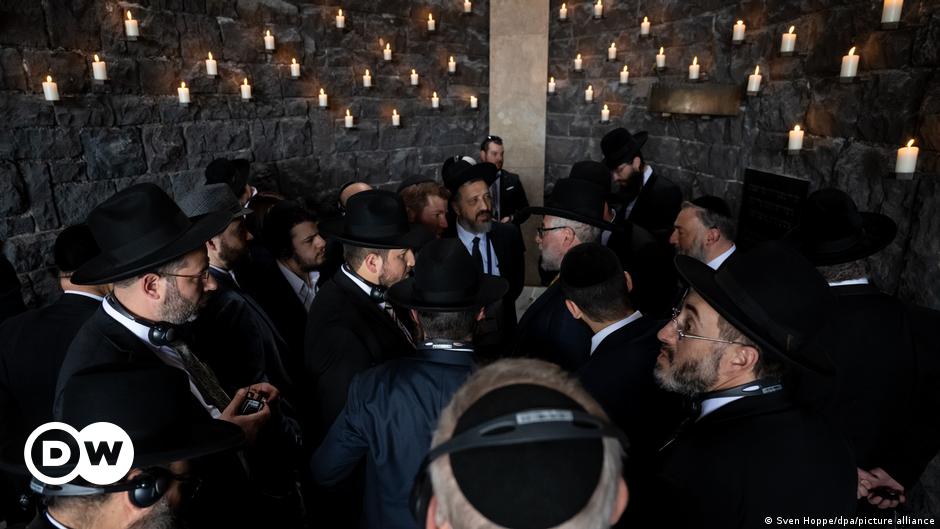
On the last day of the Conference of European Rabbis’ meeting in Germany, participants visited the memorial site of the former Nazi concentration camp in Dachau.
There, Aharon Brodman, the Orthodox rabbi of Munich, spoke about his father and grandfather, who were victims of the Holocaust. “How symbolic it is that I stand here in Dachau as the grandson of David Brodman, who was murdered in Auschwitz,” he said.
Dachau was Germany’s first concentration camp and was built in March 1933, just weeks after the Nazis came to power. More than 200,000 prisoners from over 40 countries passed through here, including 50,000 Jews. Some 41,500 of the prisoners lost their lives at Dachau.
The Dachau trip was part of an historic conference that saw 300 Orthodox rabbis from 47 countries meet for three days in Munich this week. They came from across Europe, but also from further afield: Morocco, Iran, Mexico and Colombia.
The rabbis paid tribute to Holocaust victims at Dachau
Historic meeting at a historic location
This was only the second such meeting, known as a General Assembly, in Germany. The first was a gathering with fewer participants in 2013 in Berlin.
This year, Rabbi Pinchas Goldschmidt, the head of the Conference of European Rabbis, or CER, recalled that it was in Munich, in November 1938, that Hitler’s propaganda minister, Joseph Goebbels, delivered his speech inciting a nationwide pogrom against Jews. The persecution that ensued was later described as the “night of broken glass,” or Kristallnacht.
Neither the German President nor any member of the Germany’s Cabinet made an appearance at this year’s gathering.
Watch video 07:44 The Day: The cost of being visibly Jewish in Germany
At a time of increasing antisemitism across Europe, the meeting posed a major security challenge. Even before the conference began, police officers patrolled the conference venue, even at night. During the day, plainclothes security forces were constantly walking up and down inside the building.
When 12 of the rabbis traveled by bus to Munich’s Olympic Park to commemorate the 11 Israeli athletes murdered by Palestinian terrorists at the 1972 Olympics, they were accompanied by several dozen police officers.
Germany has seen a rise in the number of antisemitic attacks and politicians have begun to take action to increase legal and security measures in recent years.
There was heavy security throughout the conference
Jewish life in Europe
Against this backdrop, Rabbi Goldschmidt described the blossoming of new Jewish communities in Germany as a “miracle.” But he also warned against restrictions on religious freedom in several European countries. He said that if, for example, a country bans the circumcision of newborn boys or ritual slaughter, Jewish life becomes impossible there and Jews have to leave the country.
Daniel Höltgen, the special representative at the Council of Europe for antisemitism, anti-Islam and other forms of religious intolerance and hate crime, addressed the problem of antisemitism among Muslims. Religious communities and civil societies, he suggested, should organize “grassroots encounters” at local level that addressed the issue.
One of the younger rabbis at the Munich gathering was Moshe David HaCohen from Malmo, Sweden. The city has long been notorious for antisemitic incidents and numerous Jews have moved away. The Malmo rabbi described how he brings groups of Jewish and Muslim youth together to promote understanding.
The fight against antisemitism was the main focus of this year’s discussions but issues of religious law and liturgical arrangements were also a topic of debate.
Watch video 03:05 ‘A very significant part of the Jewish community has left Russia’: Chief Rabbi of Moscow speaks to DW
In general, the impact of the Russian aggression against Ukraine overshadowed the gathering. Many of the rabbis gathering in Munich have relatives in Ukraine. Poland’s chief rabbi, Michael Schudrich, talked about the fate of Holocaust survivors in Ukraine.
And the situation of Jews in Russia is also changing. “A significant part of the Jews have already left the country,” Rabbi Goldschmidt, who serves as chief rabbi of Moscow, told DW. “And many more are considering taking that step.” Goldschmidt himself currently lives in Jerusalem.
On the final evening of the gathering, all dark thoughts were pushed aside. The clergy celebrated until well after midnight. For hours, the conference hall was filled with Hasidic rock music with pious lyrics. And the rabbis, old and young, danced exuberantly in front of the stage. Because that too is part of Jewish life in 2022.
This article was originally written in German.
While you’re here: Every Tuesday, DW editors round up what is happening in German politics and society. You can sign up herefor the weekly email newsletter Berlin Briefing.







